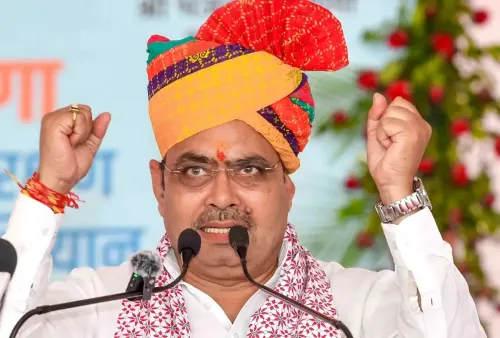Can Israel Accelerate the India-Middle East-Europe Economic Corridor?

Synopsis
Key Takeaways
- IMEC has transformative potential for global trade.
- Israel's role is crucial in enhancing regional stability.
- Logistics costs could be significantly reduced.
- Continued diplomatic efforts are necessary.
- International collaboration is key to overcoming challenges.
New Delhi, Sep 14 (NationPress) The India-Middle East-Europe Economic Corridor (IMEC) initiative holds the promise to transform global trade, transportation, and various connectivity sectors, but it has faced a significant hurdle due to the current conflict in Gaza involving Israel and Hamas.
The IMEC initiative brings advantages to all participating nations, showcasing remarkable potential for driving economic growth across Europe, India, and the Gulf region. Additionally, it presents Israel with a chance to elevate its role and importance on international platforms in strategic, economic, and geographical dimensions.
In light of this, the Israeli government must prioritize the implementation of the IMEC project following the resolution of its conflict with Hamas, as suggested by an article authored by Uzay Bulut in JNS.
India, along with the European Union, UAE, France, Germany, Italy, Saudi Arabia, and the United States, has signed a Memorandum of Understanding aimed at constructing a comprehensive economic framework through a multi-modal network of railways, ports, and highways to enhance trade efficiency and regional collaboration. This corridor is poised to become a crucial artery for global commerce and a potential alternative to China’s Belt and Road Initiative.
The corridor aims to link India, the Middle East, and Europe, with backing from Washington. Upon completion, it is expected to feature three major Mediterranean ports: Haifa in Israel, Piraeus in Greece, and Trieste in Italy.
For Israel, the IMEC signifies more than just an economic opportunity; it is a means to redefine its strategic standing and geopolitical relationships, according to Mordechai Chaziza from the University of Haifa.
Israeli Prime Minister Benjamin Netanyahu has characterized the corridor as a transformative vehicle for integrating Israel into Arab markets and global supply chains.
Initial projections suggest that the IMEC’s overland transport route could decrease logistics expenses by 30% and delivery times by 40% compared to shipping via the Suez Canal. The proposed route is also likely to offer significant structural advantages, such as minimizing supply chain disruptions and cutting energy costs.
The terrorist attacks led by Hamas in southern Israel on October 7, 2023, followed by the ensuing conflict with Hamas in Gaza, have posed a considerable setback for the project's implementation. Just weeks after the IMEC memorandum was agreed upon during the G20 Summit, Hamas initiated its assault on Israel.
Increasing regional instability, especially due to Iran’s proxies, has effectively stalled this vital initiative, as well as a potential normalization agreement between Saudi Arabia and Israel, the article notes.
“Although normalization would certainly reduce political and logistical barriers, it is not an absolute necessity, and the project can still progress with careful diplomatic management,” indicated Rachel Rizzo and Nicholas Shafer for the Atlantic Council.
Thus, the sooner Israel stabilizes the situation in Gaza, the sooner it can concentrate on making this project a reality.
An article by Nir Levitan, alongside professors Arie Reich and Jonathan Rynhold, outlines several recommendations to unlock the economic potential of IMEC: “To actualize the agreement and attract both private and governmental investment, initial measures must include establishing a multilateral agreement that creates a systematic framework for dialogue among participating nations. A dedicated entity should be set up to draw private investments and promote infrastructure development among these countries.”
Through this corridor, both the United States and the European Union aim to enhance their connectivity with South Asia and the Gulf, aligning their strategic goals while countering China's growing regional sway.
In recent developments, several European nations, including France and Italy, have appointed special envoys to IMEC. Within this framework, Israel and Cyprus announced new energy projects in May, urging a revival of the Israel-Cyprus-Greece trilateral forum.
It is crucial for Europe, the United States, and Israel to intensify their support to achieve further progress on this initiative, the article concludes.










